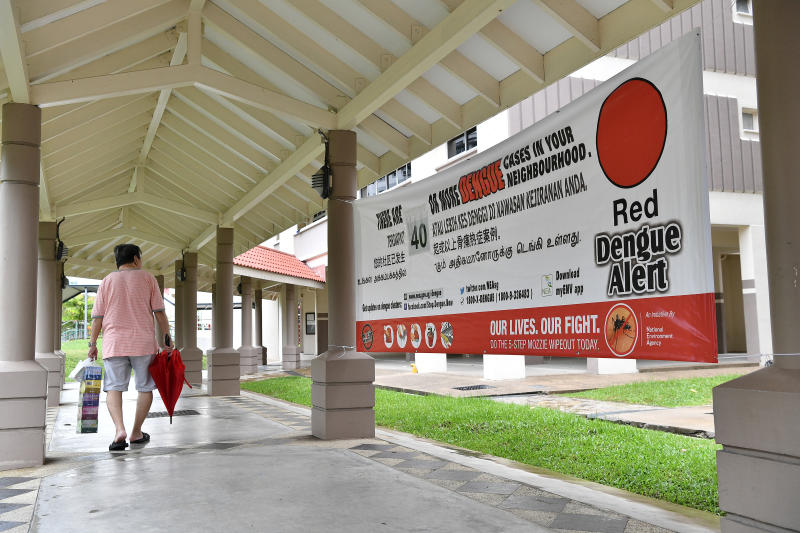NEA destroys 100 mosquito breeding habitats at Bedok dengue cluster
Sign up now: Get ST's newsletters delivered to your inbox

There were 17 active dengue clusters across Singapore as of Dec 5, 2018, with the largest being the Bedok cluster
ST PHOTO: CHONG JUN LIANG
SINGAPORE - The authorities have found and destroyed 100 mosquito breeding habitats in the Bedok area - the largest among 17 active dengue clusters discovered here.
The Bedok area accounted for 42 of the 110 dengue cases reported across Singapore in the week that ended last Saturday - the first time this year that dengue cases have crossed the century mark in a week.
A spokesman for the National Environment Agency (NEA) said the dengue cases in the Bedok area jumped to 44 as of Wednesday.
Inspections done in the cluster area, which comprises around 15 blocks, found that 53 of the breeding grounds were on residential premises, while 47 were in common areas, said the spokesman.
The cluster comprises Block 124 in Bedok Reservoir Road, Blocks 662, 665, 667 and 669 in Jalan Damai, Blocks 645, 648 to 650, 655 to 660 in Jalan Tenaga, Kaki Bukit Crescent and Kaki Bukit Road 3.
The 17 active dengue clusters also included an area in Woodlands Circle, where 37 incidents of dengue fever were reported.
Six areas in Singapore, including the Bedok cluster, have been marked as high-risk areas, where 10 or more cases of dengue have been reported.
The NEA said the process of exterminating mosquitoes has been taking place since Oct 13, when the Bedok area was designated a cluster. Inspections by NEA officers will continue.
The agency also said insecticide will be sprayed periodically in common areas such as void decks to kill adult mosquitoes.
The NEA advises residents to use insect repellent to avoid being bitten and to check their homes daily for potential breeding sites.
Besides putting up alert banners and posters in the area, the NEA is also working with the community to conduct house visits to raise awareness, with pamphlets and insect repellent distributed during the visits.
"As adult mosquitoes could be resting in indoor spaces, we also request residents to allow NEA officers to carry out spraying of their homes," said the NEA spokesman.
Ms Serena Tan, 39, a housewife living in one of the blocks in Jalan Damai, said she changes the trays used for her indoor house plants every day as she does not want her children to get infected.
"Since some leaflets have been distributed during the house visits, we have been very conscientious in making sure there is no stagnant water lying around at home," she said.
Another resident, Ms Andrea Tan, 29, who works in sales, said she was anxious about the area around her flat being part of a dengue hot spot.
"Dengue can be a deadly disease, and I hope the NEA can use all methods possible to get the mosquitoes out of the area," Ms Tan said.
"There are primary and secondary schools just a stone's throw from mosquito breeding grounds, and this is not safe for the kids." She was referring to Bedok North Secondary and Telok Kurau Primary, both located within 500m of the blocks with reported dengue cases.
Symptoms of dengue, which is transmitted through bites from the Aedes aegypti mosquito, include the sudden onset of fever for two to seven days, severe headaches with pain behind the eyes, joint and muscle pain, skin rashes, nausea, vomiting, bleeding from the nose or gums, and easy bruising.
Dengue updates can be found on the NEA website, the Stop Dengue Now Facebook page or NEA's myENV app.
Correction note: This article has been edited for clarity.


